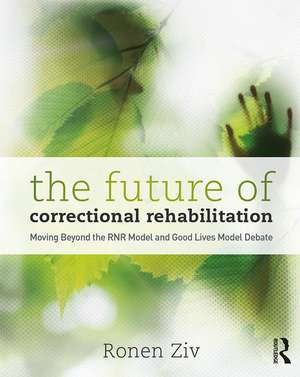The Future of Correctional Rehabilitation: Moving Beyond the RNR Model and Good Lives Model Debate
Autor Ronen Ziven Limba Engleză Paperback – 29 aug 2017
Through a detailed examination of both models’ theoretical and correctional frameworks, The Future of Correctional Rehabilitation: Moving Beyond the RNR Model and Good Lives Model Debate probes the extent to which the models offer incompatible or compatible approaches to offender treatment, and suggests how to integrate the RNR and GLM approaches to build a new and hopefully more effective vision for offender treatment. A foreword by renowned criminologist Francis T. Cullen helps put the material into context. This book will be of much interest to scholars and students studying correctional rehabilitation as well as practitioners working with offenders.
| Toate formatele și edițiile | Preț | Express |
|---|---|---|
| Paperback (1) | 329.48 lei 6-8 săpt. | |
| Taylor & Francis – 29 aug 2017 | 329.48 lei 6-8 săpt. | |
| Hardback (1) | 766.65 lei 6-8 săpt. | |
| Taylor & Francis – 24 aug 2017 | 766.65 lei 6-8 săpt. |
Preț: 329.48 lei
Preț vechi: 424.21 lei
-22% Nou
Puncte Express: 494
Preț estimativ în valută:
63.05€ • 65.99$ • 52.47£
63.05€ • 65.99$ • 52.47£
Carte tipărită la comandă
Livrare economică 31 martie-14 aprilie
Preluare comenzi: 021 569.72.76
Specificații
ISBN-13: 9781138095984
ISBN-10: 1138095982
Pagini: 234
Ilustrații: 6 Tables, black and white
Dimensiuni: 187 x 235 x 17 mm
Greutate: 0.43 kg
Ediția:1
Editura: Taylor & Francis
Colecția Routledge
Locul publicării:Oxford, United Kingdom
ISBN-10: 1138095982
Pagini: 234
Ilustrații: 6 Tables, black and white
Dimensiuni: 187 x 235 x 17 mm
Greutate: 0.43 kg
Ediția:1
Editura: Taylor & Francis
Colecția Routledge
Locul publicării:Oxford, United Kingdom
Public țintă
Postgraduate and UndergraduateCuprins
Foreword by Francis T. Cullen. Part I Beyond Nothing Works. Chapter 1 The Rise and Fall of the Rehabilitative Idea. Chapter 2 Reaffirming Rehabilitation. Part II The Risk-Need-Responsivity Model. Chapter 3 The Theoretical Foundation of the RNR Model. Chapter 4 The Principles of Effective Correctional Treatment: Theory and Technology. Part III The Good Lives Model. Chapter 5 The Theoretical Foundation of the Good Lives Model. Chapter 6 Building Good Lives Through Correctional Intervention. Part IV The Future of Rehabilitation. Chapter 7 The RNR-GLM Debate. Chapter 8 Beyond the RNR-GLM Debate: Two Futures for Offender Rehabilitation.
Notă biografică
Ronen Ziv, PhD, is a research fellow of the University of Cincinnati Corrections Institute and a teaching fellow in the Department of Social Sciences, School of Criminology, at the University of Haifa, Israel. He received his MS (2012) and PhD (2016) in criminal justice from the University of Cincinnati. Previously, he received his LLB (2005) and LLM (2006) in Law from Tel-Aviv University and worked as a criminal defense lawyer. His current research interests are in developing and testing the evidence-based approach to correctional rehabilitation, the integration of motivational theories in correctional intervention, and the capacity of correctional agencies to implement a promising correctional framework that aims to rehabilitate offenders.
Descriere
This text probes the extent to which the models offer compatible approaches, and suggests how to integrate the RNR and GLM approaches to build a new vision for offender treatment
